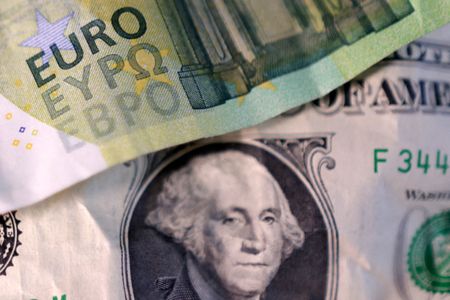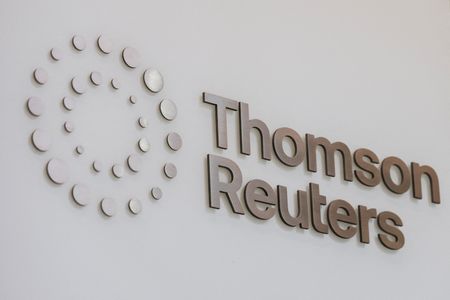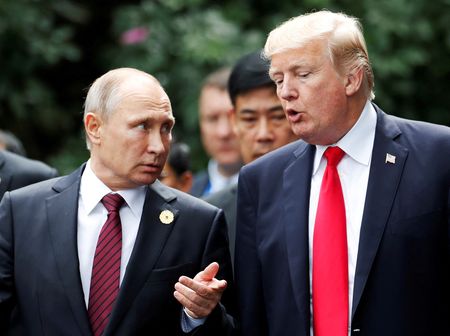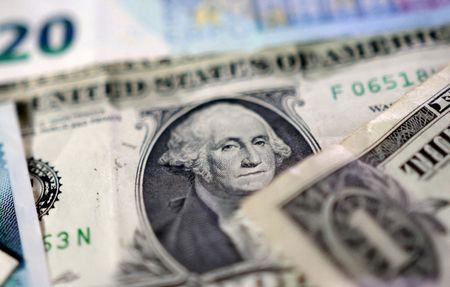By Naomi Rovnick and Yoruk Bahceli
LONDON (Reuters) – Investors are calling time on a rally in European stocks and the euro after a blistering first quarter that many fear has exaggerated how fast a planned public spending boom can revive the region’s still sluggish economy and shore it up against trade war risks.
Big asset managers including Amundi, Europe’s largest, said they had held back or reduced bets on the euro or trimmed bullish European equity trades, as U.S. President Donald Trump prepares to announce reciprocal trade tariffs on April 2.
Many said that the so-called Europhoria trade that propelled German shares to their best quarter since 2022 and the euro to a five-month high earlier in March had already factored in most foreseeable economic stimulus gains.
“If the Trump administration decides to push trade partners towards a trade war it will be bearish for European equities,” Edmond de Rothschild Asset Management CIO Benjamin Melman said, adding he did not expect outsized gains for European stocks from here.
Global markets were roiled on Thursday following Trump’s announcement of a 25% levy on car imports, with European equities down as much as 2% as billions of euros were wiped off German automakers’ shares.
Pictet Asset Management’s chief strategist, Luca Paolini, said more bad news on tariffs would probably hit European assets that had boomed on stimulus hopes harder than U.S. markets already depressed by the White House’s erratic trade policy.
“I think it makes sense not to reverse out of Europe but to take some profits,” he said. “The easy wins are over.”
LOSE-LOSE
As the market view of tariff winners and losers switched around, the euro dropped close to $1.01 in February before rebounding as high as $1.095 on March 18.
Amundi’s head of global FX Andreas Koenig said the group would refrain from building positions favouring the euro in case markets reverted to an expectation of tariffs supporting the dollar.
“What we all have in front of us still is April 2,” Koenig said, in reference to what Trump has dubbed “Liberation Day”.
Chris Jeffery, head of macro strategy at Britain’s biggest asset manager Legal & General Investment Management, said the group had reduced a bet on the euro strengthening while Eren Osman, head of investment management at London bank Arbuthnot Latham, said he had scaled back a bet on European stocks but retained a slightly positive tilt.
Although Osman called an all-out trade war a “lose-lose” situation for global equities, he said stimulus spending might help European assets to do better than others in such a scenario.
“I don’t think defence spending in Europe keeps it above water,” he said. “But the fiscal boost is a separate narrative that provides a bit of support.”
‘SLOW AGONY’
Former European Central Bank chief Mario Draghi said in a widely read report last year that Europe faced “slow agony” and needed a more coordinated industrial policy, speedier decision making and an innovation boost on top of massive investment.
“For this rally to have a second leg, markets will need a new trigger. Hints that parts of the Draghi reports would be implemented would be key,” said Rothschild’s Melman, who is neutral on European stocks.
Europe’s economic recovery is just starting to build, with business activity in mild growth territory and Germany predicting a two-year downturn will end.
Citi’s euro area economic surprise index, which records whether data is surpassing market expectations, has been positive since early February.
But its separate gauge of whether actual euro zone data is trending above its one-year average remains below zero, showing there is no broad-based upswing.
Royal London Asset Management head of multi-asset Trevor Greetham said the UK group was considering a reduction in its U.S. equity holdings and favoured Europe.
“It’s not that you can see a boom coming in Europe,” he said, but he favoured the region “in relative terms”.
Meanwhile, Russell Investments chief investment strategist Andrew Pease said the group’s main global equity fund had a small positive bias to European stocks because the region’s long-term prospects had improved, but was not adding more.
“The big question mark around all this is April 2,” he said. “If this causes a global downturn then Europe can’t escape it.”
(Reporting by Naomi Rovnick and Yoruk Bahceli, Editing by Dhara Ranasinghe and Kirsten Donovan)










